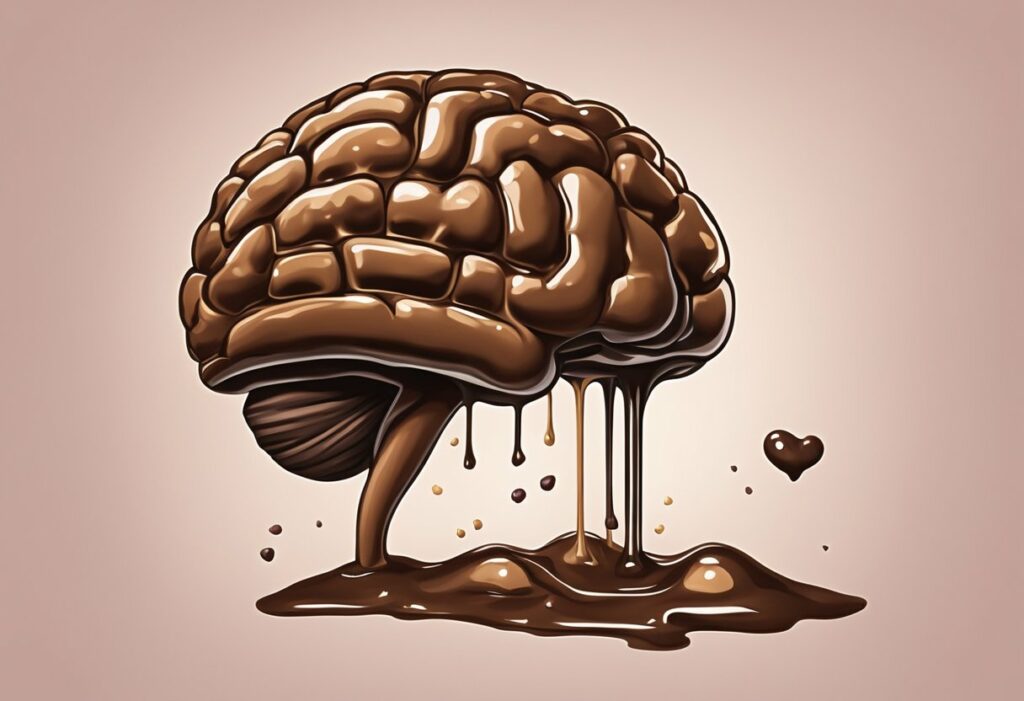The Sweet Connection: Chocolate’s Love-Like Effects on the Brain – Unraveling the Neurological Romance

Chocolate has long been associated with feelings of pleasure and indulgence, but what is it about this rich confectionery that captivates the senses and often mirrors the emotions of love?
Scientific research offers insights into the neurochemical ballet that unfolds within the brain when people consume chocolate. Cocoa, the cornerstone of all chocolate products, houses a symphony of compounds that interact with the human brain’s chemistry, yielding a variety of responses that echo the warm glow of affection.
One noteworthy component in chocolate is phenylethylamine, a compound naturally found in the brain and released in large quantities when people fall in love. This chemical stimulates the brain in a fashion akin to the effects of romance, triggering the release of certain neurochemicals associated with pleasure and attraction.
The allure of chocolate may stem from its ability to mimic these chemical signals, enveloping consumers in a comforting sense of well-being that parallels the sentiment of love.
Chemistry of Chocolate

Chocolate is more than just a confectionery delight; it contains various biochemical compounds that interact with the human brain to produce pleasurable effects. This section explores the active compounds in chocolate and how they influence the neurotransmitters in the brain.
Active Compounds in Chocolate
Chocolate contains over 300 chemicals, and several of them, including flavonoids, caffeine, theobromine, and phenylethylamine, are significant for their effects on the brain. The table below lists these compounds and their primary functions:
| Compound | Primary Function |
|---|---|
| Flavonoids | Antioxidants that may lower blood pressure and improve heart health |
| Caffeine | Stimulant that enhances alertness and reduces fatigue |
| Theobromine | Mild stimulant similar to caffeine but with a longer effect |
| Phenylethylamine | Stimulates the brain to release endorphins, elevating mood |
Neurotransmitters and Chocolate
Neurotransmitters are the brain’s chemical messengers. Chocolate influences the activity of certain neurotransmitters, such as dopamine and serotonin. These are crucial for mood regulation and can have a profound impact on feelings of pleasure and satisfaction.
- Dopamine: Associated with pleasure and reward pathways in the brain. Chocolate consumption leads to a release of dopamine, which is why it’s often associated with feelings of happiness.
- Serotonin: Known as a natural mood stabilizer. Dark chocolate, which is rich in serotonin, can boost serotonin levels in the brain and promote a sense of calmness and contentment.
Psychological Effects

Chocolate consumption can trigger notable psychological changes. These effects are primarily due to compounds in chocolate known to influence mood and behavior.
Emotional Responses to Chocolate
Eating chocolate can evoke emotional responses similar to those associated with being in love, owing to its phenylethylamine content. Phenylethylamine is a compound that naturally occurs in chocolate and functions as a neurotransmitter to help regulate mood. It is often cited for its capability to produce euphoria and attraction by releasing endorphins in the brain. The experience of eating chocolate can result in a temporary mood lift, providing a sense of comfort and pleasure.
Chocolate Cravings
Cravings for chocolate are not just about a sweet tooth; they are often linked to the brain’s reward system.
- Serotonin: The carbohydrates in chocolate enable the brain to produce more serotonin, a neurotransmitter that enhances mood and reduces stress. This can make chocolate a go-to for emotional comfort.
- Theobromine: This stimulant, similar to caffeine, can boost energy levels and alertness, making chocolate a desired snack for a mental or physical pick-me-up.
These biochemical effects explain why some individuals may experience intense cravings for chocolate in times of stress or as a reward mechanism.
Health Perspectives

In understanding chocolate’s effects on the brain, one must consider both the potential health benefits and the importance of moderation.
Benefits of Chocolate Consumption
Chocolate, particularly dark chocolate, is known for its rich content of flavonoids, which are plant compounds with antioxidant properties. Studies suggest that these flavonoids contribute to:
- Improved Heart Health: Regular consumption of small amounts of dark chocolate may reduce the risk of heart disease.
- Enhanced Brain Function: Flavonoids can increase blood flow to the brain, potentially improving cognitive functions and delaying memory decline in older adults.
Risks and Moderation
While chocolate has health benefits, it also contains:
| Substance | Potential Risk |
|---|---|
| Sugar | Can lead to weight gain and dental issues |
| Calories | May contribute to obesity if overconsumed |
| Caffeine | Can cause restlessness and sleep problems |
Consuming chocolate in large quantities or choosing products with high sugar and fat content can negate its benefits. It is therefore crucial for chocolate to be enjoyed as part of a balanced diet and in moderation.

